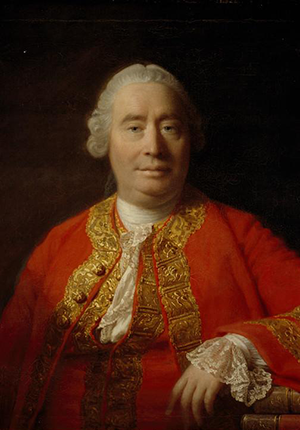Historic Document
Essays Moral, Political and Literary (1741-58)
David Hume | 1741-58

National Galleries of Scotland, Bequeathed by Mrs Macdonald Hume to the National Gallery of Scotland and transferred.
Summary
David Hume (1711-76) was the author of A Treatise of Human Nature (1739-40), Essays Moral, Political and Literary (1741-58), A History of England (1754-62), and other works. The first of the works written by Hume is celebrated by contemporary students of philosophy, but it was not much read in its author’s own day. His essays, in their various and growing editions, were exceedingly popular and the same can be said for the volumes of his history as they appeared. Some in America found this enlightened Scot’s skeptical treatment of radical Whig claims about first principles and English history distasteful. Thomas Jefferson called Hume “a degenerate son of science.” James Madison claimed he was a “bungling lawgiver.” And John Adams accused him of being an “atheist, deist, and libertine.” But Hume’s influence, especially in the period of constitution-making, was nonetheless very great. In fact, in the period stretching from 1760 to 1800, he was in America the fourth most-cited secular author. Hume’s insight into human nature and the routinely factionalized, partisan nature of political life – which called for practical, often partisan, political solutions – combined with his effortless, lively, breezy style of writing, made Hume’s essays especially popular reading in America. When Alexander Hamilton referred to that “just political maxim” that “every man must be supposed a knave,” he was simply plucking a passage from Hume’s essay, “Of the Independency of Parliament.”
Selected by

Paul Rahe
Professor of History and Charles O. Lee and Louise K. Lee Chair in the Western Heritage at Hillsdale College

Jeffrey Rosen
President and CEO, National Constitution Center

Colleen A. Sheehan
Professor of Politics at the Arizona State University School of Civic and Economic Thought and Leadership
Document Excerpt
“Of the Independency of Parliament” (1741):
Political writers have established it as a maxim, that, in contriving any system of government, and fixing the several checks and controls of the constitution, every man ought to be supposed a knave, and to have no other end, in all his actions, than private interest. By this interest we must govern him, and by means of it, make him, notwithstanding his insatiable avarice and ambition, co-operate to public good. Without this, say they, we shall in vain boast of the advantages of any constitution, and shall find, in the end, that we have no security for our liberties or possessions, except the good-will of our rulers; that is, we shall have no security at all.
It is, therefore, a just political maxim, that every man must be supposed a knave: Though at the same time, it appears somewhat strange, that a maxim should be true in politics, which is false in fact. But to satisfy us on this head, we may consider that men are generally more honest in their private than in their public capacity, and will go greater lengths to serve a party, than when their own private interest is alone concerned.
“Idea of a Perfect Commonwealth” (1777):
All plans of government, which suppose great reformation in the manners of mankind, are plainly imaginary. Of this nature, are the Republic of Plato, and the Utopia of Sir Thomas More. The Oceana [of James Harrington] is the only valuable model of a commonwealth, that has yet been offered to the public. . . . .
“Of Parties in General”—As much as legislators and founders of states ought to be honoured and respected among men, as much ought the founders of sects and factions to be detested and hated; because the influence of faction is directly contrary to that of laws. Factions subvert government, render laws impotent, and beget the fiercest animosities among men of the same nation, who ought to give mutual assistance and protection to each other. And what should render the founders of parties more odious is, the difficulty of extirpating these weeds, when once they have taken root in any state. They naturally propagate themselves for many centuries, and seldom end but by the total dissolution of that government, in which they are sown. They are, besides, plants which grow most plentifully in the richest soil; and though absolute governments be not wholly free from them, it must be confessed, that they rise more easily, and propagate themselves faster in free governments, where they always infect the legislature itself, which alone could be able, by the steady application of rewards and punishments, to eradicate them. Factions may be divided into PERSONAL and REAL; that is, into factions, founded on personal friendship or animosity among such as compose the contending parties, and into those founded on some real difference of sentiment or interest. The reason of this distinction is obvious; though I must acknowledge, that parties are seldom found pure and unmixed, either of the one kind or the other. . . .
Personal factions arise most easily in small republics. Every domestic quarrel, there, becomes an affair of state. Love, vanity, emulation, any passion, as well as ambition and resentment, begets public division. . . .
Men have such a propensity to divide into personal factions, that the smallest appearance of real difference will produce them. What can be imagined more trivial than the difference between one colour of livery and another in horse races? Yet this difference begat two most inveterate factions in the GREEK empire, the PRASINI and VENETI, who never suspended their animosities, till they ruined that unhappy government. . . .
Real factions may be divided into those from interest, from principle, and from affection. Of all factions, the first are the most reasonable, and the most excusable. Where two orders of men, such as the nobles and people, have a distinct authority in a government, not very accurately balanced and modelled, they naturally follow a distinct interest; nor can we reasonably expect a different conduct, considering that degree of selfishness implanted in human nature. It requires great skill in a legislator to prevent such parties; and many philosophers are of opinion, that this secret, like the grand elixir, or perpetual motion, may amuse men in theory, but can never possibly be reduced to practice. . . .
Parties from principle, especially abstract speculative principle, are known only to modern times, and are, perhaps, the most extraordinary and unaccountable phænomenon, that has yet appeared in human affairs. Where different principles beget a contrariety of conduct, which is the case with all different political principles, the matter may be more easily explained. A man, who esteems the true right of government to lie in one man, or one family, cannot easily agree with his fellow-citizen, who thinks that another man or family is possessed of this right. Each naturally wishes that right may take place, according to his own notions of it. But where the difference of principle is attended with no contrariety of action, but every one may follow his own way, without interfering with his neighbour, as happens in all religious controversies; what madness, what fury can beget such unhappy and such fatal divisions?
“Of the First Principles of Government” Nothing appears more surprizing to those, who consider human affairs with a philosophical eye, than the easiness with which the many are governed by the few; and the implicit submission, with which men resign their own sentiments and passions to those of their rulers. When we enquire by what means this wonder is effected, we shall find, that, as Force is always on the side of the governed, the governors have nothing to support them but opinion. It is therefore, on opinion only that government is founded; and this maxim extends to the most despotic and most military governments, as well as to the most free and most popular. . . .
Opinion is of two kinds, to wit, opinion of interest, and opinion of right. By opinion of interest, I chiefly understand the sense of the general advantage which is reaped from government; together with the persuasion, that the particular government, which is established, is equally advantageous with any other that could easily be settled. When this opinion prevails among the generality of a state, or among those who have the force in their hands, it gives great security to any government.
Right is of two kinds, right to Power and right to Property. What prevalence opinion of the first kind has over mankind, may easily be understood, by observing the attachment which all nations have to their ancient government, and even to those names, which have had the sanction of antiquity. Antiquity always begets the opinion of right; and whatever disadvantageous sentiments we may entertain of mankind, they are always found to be prodigal both of blood and treasure in the maintenance of public justice. There is, indeed, no particular, in which, at first sight, there may appear a greater contradiction in the frame of the human mind than the present. When men act in a faction, they are apt, without shame or remorse, to neglect all the ties of honour and morality, in order to serve their party; and yet, when a faction is formed upon a point of right or principle, there is no occasion, where men discover a greater obstinacy, and a more determined sense of justice and equity. The same social disposition of mankind is the cause of these contradictory appearances.
It is sufficiently understood, that the opinion of right to property is of moment in all matters of government. A noted author has made property the foundation of all government; and most of our political writers seem inclined to follow him in that particular. This is carrying the matter too far; but still it must be owned, that the opinion of right to property has a great influence in this subject. Upon these three opinions, therefore, of public interest, of right to power, and of right to property, are all governments founded, and all authority of the few over the many. There are indeed other principles, which add force to these, and determine, limit, or alter their operation; such as self-interest, fear, and affection: But still we may assert, that these other principles can have no influence alone, but suppose the antecedent influence of those opinions above-mentioned. They are, therefore, to be esteemed the secondary, not the original principles of government.
“Of Refinement in the Arts” (1752):
If we consider the matter in a proper light, we shall find, that a progress in the arts is rather favorable to liberty, and has a natural tendency to preserve, if not produce a free government. In rude unpolished nations, where the arts are neglected, all labour is bestowed on the cultivation of the ground; and the whole society is divided into two classes, proprietors of land, and their vassals or tenants. The latter are necessarily dependent, and fitted for slavery and subjection; especially where they possess no riches, and are not valued for their knowledge in agriculture; as must always be the case where the arts are neglected. The former naturally erect themselves into petty tyrants; and must either submit to an absolute master, for the sake of peace and order; or if they will preserve their independency, like the ancient barons, they must fall into feuds and contests among themselves, and throw the whole society into such confusion, as is perhaps worse than the most despotic government. But where luxury nourishes commerce and industry, the peasants, by a proper cultivation of the land become rich and independent; while the tradesmen and merchants acquire a share of the property, and draw authority and consideration to that middling rank of men, who are the best and firmest basis of public liberty. These submit not to slavery, like the peasants, from poverty and meanness of spirit; and having no hopes of tyrannizing over others, like barons, they are not tempted for the sake of that gratification, to submit to the tyranny of their sovereign. They covet equal laws, which may secure their property, and preserve them from monarchical, as well as aristocratical tyranny.
The lower house is the support of our popular government; and all the world acknowledges, that it owed its chief influence and consideration to the encrease of commerce, which threw such a balance of property into the hands of the commons. How inconsistent then is it to blame so violently a refinement in the arts, and to represent it as the bane of liberty and public spirit!




